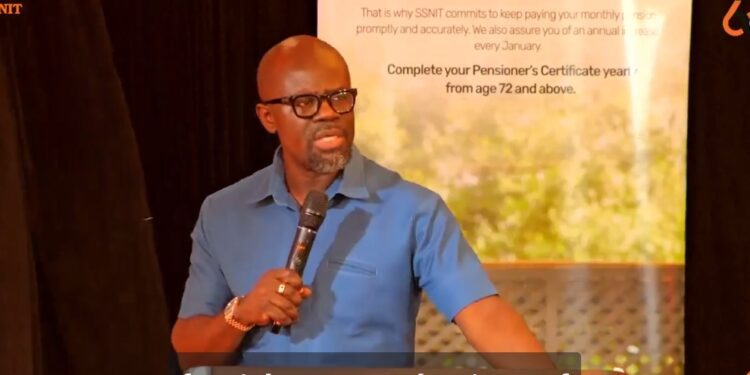Professor Ernest Kofi Abotsi, Dean of the UPSA Law School, has asserted that the payment of a minimum wage in Ghana is fundamentally unconstitutional.
The respected legal luminary contends that the Constitution mandates the government to provide a living wage, rather than merely a minimum wage.
Professor Abotsi made these significant remarks during the 2025 edition of a symposium organized by the Social Security and National Insurance Trust (SSNIT), held on Wednesday, November 5, 2025, at the La Palm Royal Beach Hotel.
His presentation focused on the topic: “Future of Social Security in Ghana and Service Delivery in the AI Era.”
According to Professor Abotsi, the continuous negotiation and payment of a minimum wage constitutes a consistent breach of constitutional law by the government.
He explicitly stated that the government’s obligation is to ensure the payment of living wages.
He elaborated that a true living wage must be indexed to the actual cost of living, which includes essential variables such as the costs of electricity, water, healthcare, and other fundamental expenditures.
However, he acknowledged the immense practical challenge, admitting that the explicit enforcement of a living wage could pose a major problem, especially considering the government is the nation’s largest employer.
Professor Abotsi lamented the current state of compensation, stating that when people are not adequately paid, deductions—such as SSNIT contributions—can feel disproportionately significant.
”There are too many people in Ghana who are still earning salaries that are not worth the name salary. In fact, the big violator of the law is government because government is the largest employer and the constitution says people should be paid… living wages and not minimum wages. The government of Ghana has consistently paid minimum wages, but the expression of minimum wages is not found in the constitution and labour consistently goes to the negotiation table and somehow negotiates for minimum wages.”
He further questioned the legal basis, threshold, or boundaries for a minimum wage.
“Living wages we know what it is, wages that can help you live. The truth of the matter however is that government can’t pay living wages because living wages must be indexed to the variables of living,” he remarked. He concluded this point by urging an honest confrontation with this reality, noting that failure to do so means the nation will “continue to dance around these issues without being honest and opening ourselves to the realities.”
Shifting his focus to the structure of social security, Professor Abotsi emphasised that arrangements like SSNIT must adhere to the fundamental principles of trust.
He defined “trust issue” specifically as a legal concept that creates a relationship between the trustee and its beneficiaries.
He urged SSNIT to cultivate this trust, operate strictly in the interest of the people, actively manage public perception, and ensure that their work is demonstrably transparent so that Ghanaians will have no cause for doubt.
By: Rainbowradioonline.com/Ghana














